专四新题型 - 阅读简答题
- 格式:ppt
- 大小:55.50 KB
- 文档页数:12

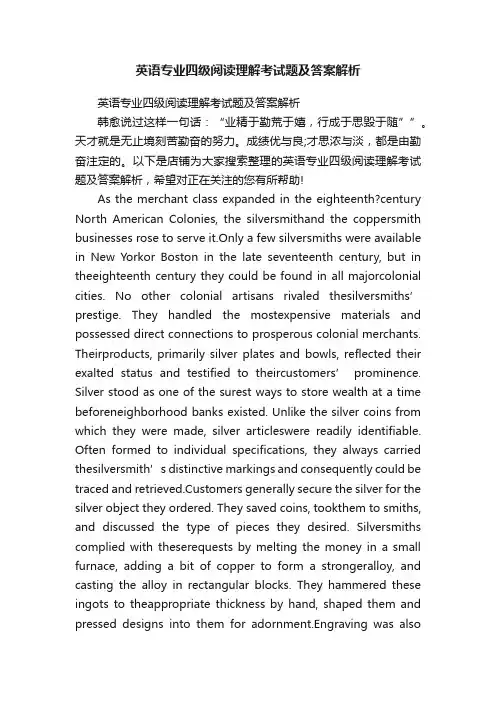
英语专业四级阅读理解考试题及答案解析英语专业四级阅读理解考试题及答案解析韩愈说过这样一句话:“业精于勤荒于嬉,行成于思毁于随””。
天才就是无止境刻苦勤奋的努力。
成绩优与良;才思浓与淡,都是由勤奋注定的。
以下是店铺为大家搜索整理的英语专业四级阅读理解考试题及答案解析,希望对正在关注的您有所帮助!As the merchant class expanded in the eighteenth?century North American Colonies, the silversmithand the coppersmith businesses rose to serve it.Only a few silversmiths were available in New Yorkor Boston in the late seventeenth century, but in theeighteenth century they could be found in all majorcolonial cities. No other colonial artisans rivaled thesilversmiths’ prestige. They handled the mostexpensive materials and possessed direct connections to prosperous colonial merchants. Theirproducts, primarily silver plates and bowls, reflected their exalted status and testified to theircustomers’ prominence. Silver stood as one of the surest ways to store wealth at a time beforeneighborhood banks existed. Unlike the silver coins from which they were made, silver articleswere readily identifiable. Often formed to individual specifications, they always carried thesilversmith’s distinctive markings and consequently could be traced and retrieved.Customers generally secure the silver for the silver object they ordered. They saved coins, tookthem to smiths, and discussed the type of pieces they desired. Silversmiths complied with theserequests by melting the money in a small furnace, adding a bit of copper to form a strongeralloy, and casting the alloy in rectangular blocks. They hammered these ingots to theappropriate thickness by hand, shaped them and pressed designs into them for adornment.Engraving was alsodone by hand. In addition to plates and bowls, some customers soughtmore intricate products, such as silver teapots. These were made by shaping or casting partsseparately and then soldering them together. Colonial coppersmithing also come of age in theearly eighteenth century and prospered in northern cities. Copper’s ability to conduct heatefficiently and to resist corrosion contributed to its attractiveness. But because it wasexpensive in colonial America, coppersmiths were never very numerous. Virtually all copperworked by Smiths was imported as sheets or obtained by recycling old copper goods. Copperwas used for practical items, but it was not admired for its beauty. Coppersmiths employed it tofashion pots and kettles for the home. They shaped it in much the same manner as silver ormelted it in a foundry with lead or tin. They also mixed it with zinc to make brass for maritimeand scientific instruments.?1、According to the passage, which of the following eighteenth century developments had strongimpact on silversmithsA. A decrease in the cost of silver.B. The invention of heat efficient furnaces.C. The growing economic prosperity of colonial merchants.D. The development of new tools used to shape silver.2.In colonial America, where did silversmiths usually obtain the material to make silver articles? ?A. From their own mines.B. From importers.C. From other silversmiths.D. From customers.3.The passage mentions all of the following as uses for copper in Colonial America EXCEPT ______A. cooking potsB. scientific instrumentsC. musical instrumentsD. maritime instruments4.According to the passage, silversmiths and coppersmiths in colonial America were similar inwhich of the following waysA. The amount of social prestige they had.B. The way they shaped the metal they worked with. ?C. The cost of the goods they made.D. The practicality of the goods they made.参考答案:1. C) 根据文章第一句“As the merchant classexpanded in the eighteenth?century North AmericanColonies,...”可知,随着在十八世纪的北美殖民地商人阶级膨胀起来,也就是说那时的商人财富有了很大的发展,银匠铜匠们有机会发挥他们的.专长了,这与选项C正好相符。
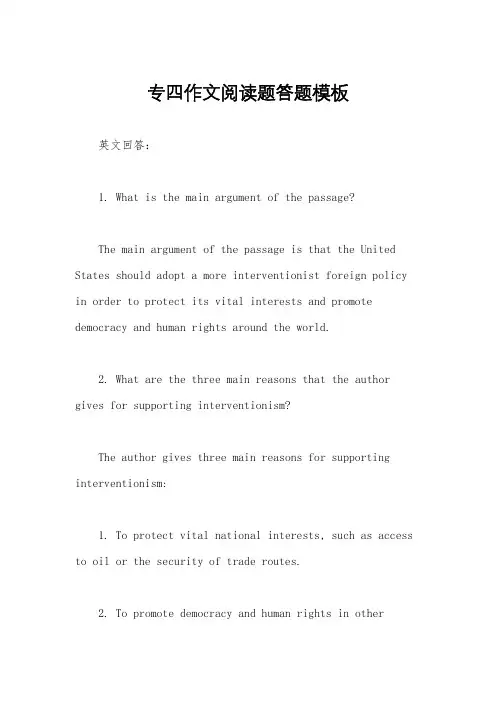
专四作文阅读题答题模板英文回答:1. What is the main argument of the passage?The main argument of the passage is that the United States should adopt a more interventionist foreign policy in order to protect its vital interests and promote democracy and human rights around the world.2. What are the three main reasons that the author gives for supporting interventionism?The author gives three main reasons for supporting interventionism:1. To protect vital national interests, such as access to oil or the security of trade routes.2. To promote democracy and human rights in othercountries.3. To prevent humanitarian crises, such as genocide or ethnic cleansing.3. What are the main arguments against interventionism?The main arguments against interventionism are:1. It is often counterproductive, leading to increased instability and violence.2. It violates the sovereignty of other countries and can lead to resentment and resistance.3. It is expensive and can divert resources from other important priorities.4. What is the author's conclusion?The author concludes that the United States should adopt a more interventionist foreign policy, but that itshould do so carefully and selectively. Intervention should only be used as a last resort, after all other options have been exhausted.中文回答:文章的论点是什么?文章的论点是美国应该采取更加干预主义的外交政策,以保护其重要利益并促进全世界民主与人权。
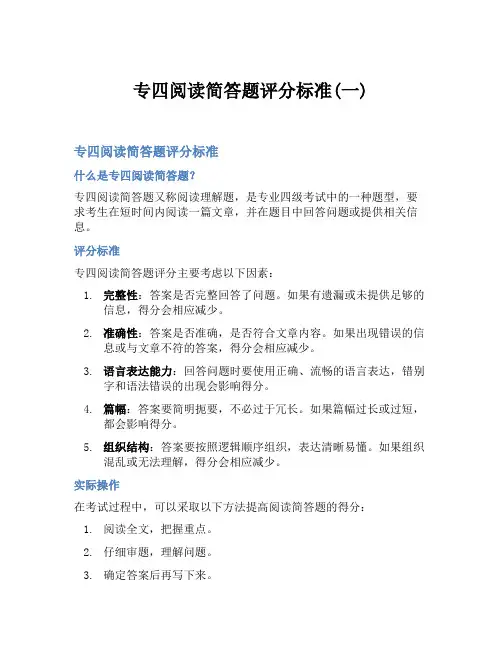
专四阅读简答题评分标准(一)专四阅读简答题评分标准什么是专四阅读简答题?专四阅读简答题又称阅读理解题,是专业四级考试中的一种题型,要求考生在短时间内阅读一篇文章,并在题目中回答问题或提供相关信息。
评分标准专四阅读简答题评分主要考虑以下因素:1.完整性:答案是否完整回答了问题。
如果有遗漏或未提供足够的信息,得分会相应减少。
2.准确性:答案是否准确,是否符合文章内容。
如果出现错误的信息或与文章不符的答案,得分会相应减少。
3.语言表达能力:回答问题时要使用正确、流畅的语言表达,错别字和语法错误的出现会影响得分。
4.篇幅:答案要简明扼要,不必过于冗长。
如果篇幅过长或过短,都会影响得分。
5.组织结构:答案要按照逻辑顺序组织,表达清晰易懂。
如果组织混乱或无法理解,得分会相应减少。
实际操作在考试过程中,可以采取以下方法提高阅读简答题的得分:1.阅读全文,把握重点。
2.仔细审题,理解问题。
3.确定答案后再写下来。
4.使用简洁明了的语言表达答案。
5.以逻辑顺序组织答案,使其结构清晰。
总结专四阅读简答题的评分标准比较严格,但只要我们在考试前做好充分的准备和练习,掌握好评分标准,相信我们一定能在考试中获得好成绩。
6.针对问题回答:要针对每个问题清晰准确地回答,不要离题或跑题。
如果回答与问题不符或未回答问题,得分会相应减少。
7.对应正确答案:要紧密联系文章内容回答问题,不要离题太远。
如果答案离题程度太大,得分会相应减少。
8.原文重现:答案需要结合原文内容进行解答,不要出现无关信息或加入个人观点。
如果没有在文章中找到对应信息或篇幅不够,得分会相应减少。
实际操作为了在考试中取得好成绩,我们可以执行以下实际操作:1.阅读全文,把握重点,理解文章内容。
2.仔细审题,确保理解所有问题,必要时多次读题。
3.高效阅读,尽可能节约时间来回答问题。
4.使用简明,并具有逻辑的语言来回答问题。
5.如果可能,使用原文中提供的引用来回答问题。
6.在答案中避免涉及到和原文无关的个人观点。
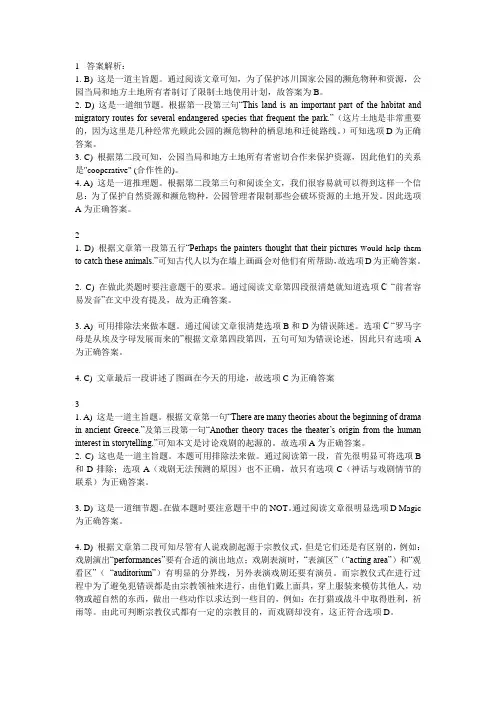
1- 答案解析:1. B) 这是一道主旨题。
通过阅读文章可知,为了保护冰川国家公园的濒危物种和资源,公园当局和地方土地所有者制订了限制土地使用计划,故答案为B。
2. D) 这是一道细节题。
根据第一段第三句“This land is an important part of the habitat and migratory routes for several endangered species that frequent the park.”(这片土地是非常重要的,因为这里是几种经常光顾此公园的濒危物种的栖息地和迁徙路线。
)可知选项D为正确答案。
3. C) 根据第二段可知,公园当局和地方土地所有者密切合作来保护资源,因此他们的关系是"cooperative" (合作性的)。
4. A) 这是一道推理题。
根据第二段第三句和阅读全文,我们很容易就可以得到这样一个信息:为了保护自然资源和濒危物种,公园管理者限制那些会破坏资源的土地开发。
因此选项A为正确答案。
2-1. D) 根据文章第一段第五行“Perhaps the painters thought that their pictures w ould help them to catch these animals.”可知古代人以为在墙上画画会对他们有所帮助,故选项D为正确答案。
2. C) 在做此类题时要注意题干的要求。
通过阅读文章第四段很清楚就知道选项C “前者容易发音”在文中没有提及,故为正确答案。
3. A) 可用排除法来做本题。
通过阅读文章很清楚选项B和D为错误陈述。
选项C “罗马字母是从埃及字母发展而来的”根据文章第四段第四,五句可知为错误论述,因此只有选项A 为正确答案。
4. C) 文章最后一段讲述了图画在今天的用途,故选项C为正确答案3-1. A) 这是一道主旨题。
根据文章第一句“There are many theories about the beginning of drama in ancient Greece.”及第三段第一句“Another theory traces the theater’s origin from the human interest in storytelling.”可知本文是讨论戏剧的起源的。
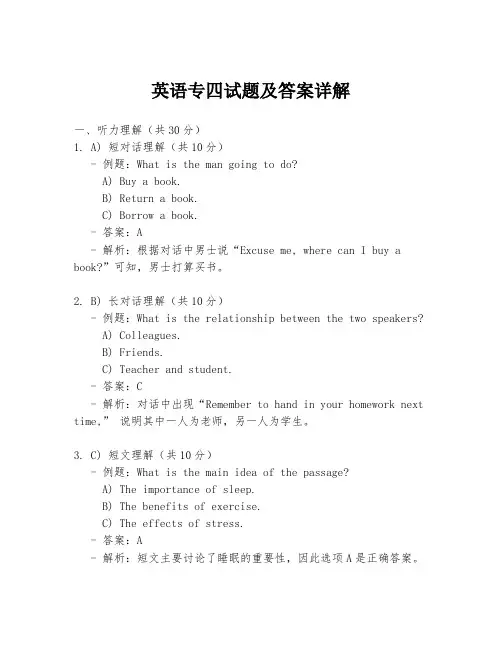
英语专四试题及答案详解一、听力理解(共30分)1. A) 短对话理解(共10分)- 例题:What is the man going to do?A) Buy a book.B) Return a book.C) Borrow a book.- 答案:A- 解析:根据对话中男士说“Excuse me, where can I buy a book?”可知,男士打算买书。
2. B) 长对话理解(共10分)- 例题:What is the relationship between the two speakers?A) Colleagues.B) Friends.C) Teacher and student.- 答案:C- 解析:对话中出现“Remember to hand in your homework next time,” 说明其中一人为老师,另一人为学生。
3. C) 短文理解(共10分)- 例题:What is the main idea of the passage?A) The importance of sleep.B) The benefits of exercise.C) The effects of stress.- 答案:A- 解析:短文主要讨论了睡眠的重要性,因此选项A是正确答案。
二、词汇与语法(共20分)1. 词汇题(共10分)- 例题:Despite the heavy rain, the game continued,_______ the players' disappointment.A) to the delight ofB) to the dismay ofC) to the surprise of- 答案:B- 解析:根据句子中的“the players' disappointment”,可知球员们感到失望,因此选择B。
2. 语法题(共10分)- 例题:I don’t think he will be able to come to the meeting this afternoon, _______?A) will heB) won’t heC) isn’t he- 答案:A- 解析:在否定前移的句子中,疑问部分要与后面的主谓结构保持一致,因此选择A。
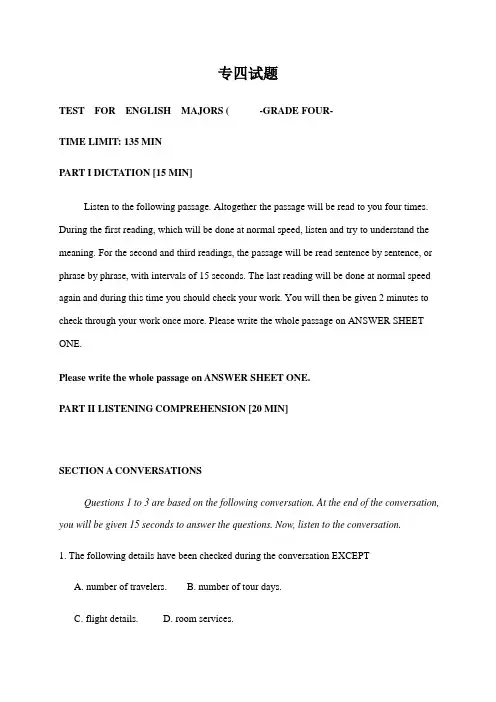
专四试题TEST FOR ENGLISH MAJORS ( -GRADE FOUR-TIME LIMIT: 135 MINPART I DICTATION [15 MIN]Listen to the following passage. Altogether the passage will be read to you four times. During the first reading, which will be done at normal speed, listen and try to understand the meaning. For the second and third readings, the passage will be read sentence by sentence, or phrase by phrase, with intervals of 15 seconds. The last reading will be done at normal speed again and during this time you should check your work. You will then be given 2 minutes to check through your work once more. Please write the whole passage on ANSWER SHEET ONE.Please write the whole passage on ANSWER SHEET ONE.PART II LISTENING COMPREHENSION [20 MIN]SECTION A CONVERSATIONSQuestions 1 to 3 are based on the following conversation. At the end of the conversation, you will be given 15 seconds to answer the questions. Now, listen to the conversation.1. The following details have been checked during the conversation EXCEPTA. number of travelers.B. number of tour days.C. flight details.D. room services.2. What is included in the price?A. Air tickets and local transport.B. Local transport and meals.C. Air tickets, local transport and breakfast.D. Air tickets, local transport and all meals.3. Which of the following statements is CORRECT?A. The traveler is reluctant to buy travel insurance.B. The traveler is ready to buy travel insurance.C. The traveler doesn't have to buy travel insurance.D. Travel insurance is not mentioned in the conversation.Questions 4 to 7 are based on the following conversation. At the end of'the conversation, you will be given 20 seconds to answer the questions. Now, listen to the conversation.4. Which of the following details is CORRECT?A. Mark knows the exact number of airport buses.B. Mark knows the exact number of delegates' spouse.C. Mark doesn't know the exact number of delegates yet.D. Mark doesn't know the number of guest speakers.5. What does Linda want to know?A. The arrival time of guest speakers.B. The departure time of guest speakers.C. The type of transport for guest speakers.D. The number of guest speakers.6. How many performances have been planned tbr the conference?A. One.B. Two.C. Three.D. Not mentioned.7. Who will pay for the piano performance?A. Pan-Pacific Tours.B. Johnson & Sons Events.C. Conference delegates.D. An airline company.Questions 8 to 10 are based on the following conversation. At the end of'the conversation,you will be given 15 seconds to answer the questions. Now listen to the conversation.8. What is NOT missing in Mary's briefcase?A. Her cheque book.B. Her papers for work.C. Her laptop.D. Her appointment book.9. Where was Mary the whole morning?A. At the police station.B. At a meeting.C. In her client's office.D. In the restaurant.10. Why was Mary sure that the briefcase was hers in the end?A. The papers inside had the company's name.B. The briefcase was found in the restaurant.C. The restaurant manager telephoned James.D. The cheque book inside bore her name.SECTION B PASSAGESIn this section, you will hear several passages. Listen to the passages carefully and then answer the questions that follow.Questions 11 to 13 are based on the following passage. At the end of the passage, yott will be given 15 seconds to answer the questions. Now, listen to the passage.11. We learn from the passage that about two-thirds of the courses are taught throughA. the School of Design and Visual Arts.B. the School of Social Work.C. the School of Business.D. the Arts and Sciences program.12.What is the cost of undergraduate tuition?A. Twenty thousand dollars.B. Thirty thousand dollars.C. Twenty-seven thousand dollars.D. Thirty-eight thousand dollars.13.International students can receive all the following types of financial assistance EXCEPTA. federal loans.B. private loans.C. scholarships.D. monthly payment plans.Questions 14 to 17 are based on the following passage. At the end of the passage, you will be gven 20 seconds to answer the questions. Now, listen to the passage.14. According to the passage, mothers in ____ spend more time looking after children.A. FranceB. AmericaC. DenmarkD. Australia15. Which of the following activities would Australian fathers traditionally participate in?A. Feeding and playing with children.B. Feeding and bathing children.C. Taking children to the park and to school.D. Taking children to watch sports events.16. According to the study, the "new man" likes toA. spend more time at work.B. spend more time with children.C. spend time drinking after work.D. spend time on his computer.17.It is suggested in the passage that the "new man" might be less acceptable inA. France.B. Britain.C. Australia.D. Denmark.Questions 18 to 20 are based on the following passage. At the end of the passage, you will be given 15 seconds to answer the questions. Now, listen to the passage.18.The services of the new partnership are provided mainly toA. mothers of infected babies.B. infected children and women.C. infected children in cities.D. infected women in cities.19.Which of the following details about Family Health International is INCORRECT?A. It is a nonprofit organization.B. It provides public health services.C. It carries out research on public health.D. It has worked in five countries till now.20.The example of Cambodia mainly showsA. the importance of government support.B. the importance of public education efforts.C. the progress the country has made so far.D. the methods used to fight AIDS.SECTION C NEWS BROADCASTIn this section, you will hear several news items. Listen to them carefully and then answer the questions that follow.Questions 21 and 22 are based on the following news. At the end of the news item, you will be given 10 seconds to answer the questions. Now. listen to the news.21. According to the news, the victim wasA. a 17-year-old girl.B. a 15-year-old boy.C. a 23-year-old woman.D. an l 8-year-old man.22.We learn from the news that the suspects were arrestedA. one month later.B. two months later.C. immediately.D. two weeks later.Questions 23 and 24 are based on the following news. At the end of the news item, you will be given 10 seconds to answer the questions. Now, listen to the news.23.The Iraqi par liament can vote on the security agreement only afterA. all parties have agreed on it.B. the US troops have pulled out.C. the cabinet has reviewed it.D. the lawmakers have returned from Mecca.24.According to the news, the US troops are expected to completely pull out byA. mid-.B. the end of .C. mid-.D. the end of .Questions 25 and 26 are based on the following news. At the end of the news item, you will begiven 10 seconds to answer the questions. Now, listen to the news.25.The following are involved in the operations to rescue the children in Honduras EXCEPTA. the police.B. the district attorney.C. the prison authorities.D. Institute of Childhood and Family.26. What punishment would parents face if they allowed their children to beg?A. To be imprisoned and fined.B. To have their children taken away.C. To be handed over to the authorities.D. None.Question 27 is based on the following news. At the end of the news item. you will be given 5seconds to answer the question. Now, listen to the news.27.What is the news item about?A. Coastlines in Italy.B. Public use of the beach.C. Swimming and bathing.D. Private bathing clubs.Question 28 is based on the following news. At the end of the news item, you will be given 5 seconds to answer the question. Now, listen to the news.28.Which of the following is NOT mentioned in the news?A. The airport was shut down for Friday.B. There was a road accident involving two buses.C. Local shops were closed earlier than usual.D. Bus service was stopped for Friday.Questions 29 and 30 are based on the following news. At the end of the news item, you will begiven 10 seconds to answer the questions. Now, listen to the news.29.How many people were rescued from the apartment building?A. 17.B. 24.C. 21.D. 41.30.Which of the following details in the news is CORRECT?A. The rescue operation involved many people.B. The cause of the explosions has been determined.C. Rescue efforts were stopped on Thursday.D. The explosions didn't destroy the building.PART III CLOZE [15 MIN]Decide which of the choices given below would best complete the passage it" inserted in thecorresponding blanks. Mark the best choice for each blank on ANSWER SHEET TWO.How men first learned to i nvent words is unknown; (31)____, the origin of language isa mystery. All we really know is that men, unlike animals, somehow invented certain(32)____ to express thoughts and feelings, actions and things, (33)____ they could communicate with each other; and that later they agreed (34)____ certain signs, called letters, which could be (35)____ to represent those sounds, and which could be (36)_____. Those sounds, whether spoken, (37)_____ written in letters, we call words.The power of words, then, lies in their (38)____ the things they bring up before our minds. Words become (39)____ with meaning for us by experience; (40)._____ the longer we live, the more certain words (41)_____ to us the happy and sad events of our past: and themore we (42)____, the more the number of words that mean something to us (43)____ Great writers are those who not only have great thoughts but also express these thoughts in words which appeal (44)____ to our minds and emotions. This (45)._____ and telling use of words is what we call (46)____ style. Above all, the real poet is a master of (47)____. He can convey his meaning in words which sing like music, and which (48)_____ their position and association can (49)____ men to tears. We should, therefore, learn to choose our words carefully and use them accurately, or they will (50)____ our speech or writing silly and vulgar.(31) A. in addition B. in other words C. in a word D. in summary(32) A. sounds B. gestures C. signs D. movements(33) A. such that B. as that C. so that D. in that(34) A. in B. with C. of D. upon(35) A. spelt B. combined C. written D copied(36) A. written down B. handed down C. remembered D. observed(37) A. and B. yet C. also D. or(38) A. functions B. associations C. roles D. links(39) A. filled B. full C. live D. active(40) A. but B. or C. yet D. and(41 ) A. reappear B. recall C. remember D. recollect(42) A. read and think B. read and recall C. read and learn D. read and recite(43) A. raises B. increases C. improves D. emerges(44) A. intensively B. extensively C. broadly D. powerfully(45) A. charming B. academic C. conventional D. common(46) A. written B. spoken C. literary D. dramatic(47) A. signs B. words C. style D. sound(48) A. in B. on C. over&n bsp; D. by(49) A. move B. engage C. make D. force(50) A. transform B. change C. make D. convertPART IV GRAMMAR & VOCABULARY [15 MIN]There are thirty sentences in this section. Beneath each sentence there are four words or phrases marked A, B, C and D. Choose one word or phrase that best completes the sentence. Mark your answers on ANSWER SHEET TWO.51. Which of the following italicized phrases indicates CAUSE?A. Why don't you do it for the sake of your friends?B. I wish I could write as well as you.C. For all his efforts, he didn't get an A.D. Her eyes were red from excessive reading.52. Nancy's gone to work but her car's still there. She ____ by bus.A. must have goneB. should have goneC. ought to have goneD. could have gone53. He feels that he is not yet ____ to travel abroad.A. too strongB. enough strongC. so strongD. strong enough54. After____ seemed an endless wait, it was his turn to enter the personnel manager's office.A. thatB. itC. whatD. there55. Fool ____ Jerry is, he could not have done such a thing.A. whoB. asC. likeD. that56. Which of the following sentences is INCORRECT?A. They each have two tickets.B. They cost twenty yuan each.C. Each they have bought the same book.D. They were given two magazines each.57. She seldom goes to the theatre, _____?A. doesn't sheB. does sheC. would sheD. wouldn't she58. Dr Johnson is head of the department, ____ an expert in translation.A. orB. eitherC. butD. and59. When one has good health, _____ should feel fortunate.A. youB. theyC. heD. we60. It is necessary that he ____ the assignment without delay.A. hand inB. hands inC. must hand inD. has to hand in61. In the sentence "It's no use waiting for her", the italicized phrase is)____.A. the objectB. an adverbialC. a complementD. the subject62. Which of the following sentences is INCORRECT?A. All his lectures are very interesting.B. Half their savings were gone.C. Many his friends came to the party.D. Both his sisters are nurses.63. Which of the following sentences has an object complement?A. The directors appointed John manager.B. I gave Mary a Christmas present.C. You have done Peter a favour.D. She is teaching children English.64. Which of the following words can NOT be used to complete "We've seen the film ____"?A. beforeB. recentlyC. latelyD. yet65. _____ should not become a serious disadvantage in life and work.A. To be not tallB. Not being tallC. Being not tallD. Not to be tall66. Due to personality _____, the two colleagues never got on well in work.A. contradictionB. conflictC. confrontationD. competition67. During the summer vacation, kids are often seen hanging _____ in the streets.A. aboutB. onC. overD. out68. There were 150 ____ at the international conference this summer.A. spectatorsB. viewersC. participantsD. onlookers69. School started on a ____ cold day in February.A. severeB. bitterC. suchD. frozen70. In the face of unexpected difficulties, he demonstrated a talent for quick, ____ action.A. determiningB. defensiveC. demandingD. decisive71. The team has been working overtime on the research project ____.A. latelyB.just nowC. lateD. long ago72. Because of the economic crisis, industrial output in the region remainedA. motionlessB. inactiveC. stagnantD. immobile73. The police had difficulty in ____ the fans fi'om rushing on to the stage to take photos with the singer.A. limitingB. restrainingC. confiningD. restricting74. Joan is in the dorm, putting the final ____ to her speech.A. detailsB. remarksC. commentsD. touches75. His_____ in gambling has eventually brought about his ruin.A. indulgenceB. habitC. actionD. engagement76. The teacher told the students to stay in the classroom and they did _____.A. absolutelyB. accidentallyC. accordinglyD. accurately77. You can actually see the deer at close range while driving through that area. The italicizedphrase means _____.A. clearlyB. very nearC. quicklyD. very hard78. He listened hard but still couldn't what they were talking about.A. make overB. make upC. make uponD. make out79. For the advertised position, the company offers a(n) salary and benefits package.A. generousB. plentifulC. abundantD. sufficient80. As there was no road, the travelers ____ up a rocky slope on their way back.A. ranB. hurriedC. scrambledD. crawledPART V READING COMPREHENSION [25 MIN]In this section there are four passages followed by questions or unfinished statements, each with four suggested answers marked A, B, C and D. Choose the one that you think is the best answer. Mark your answers on ANSWER SHEET TWO.TEXT AWhat is the nature of the scientific attitude, the attitude of the man or woman who studies and applies physics, biology, chemistry, geology, engineering, medicine or any other science? We all know that science plays an important role in the societies in which we live. Many people believe, however, that our progress depends on two different aspects of science. The first of these is the application of the machines, products and systems of applied knowledge that scientists and technologists develop. Through technology, science improves the structure of society and helps man to gain increasing control over his environment.The second aspect is the application by all members of society of the special methods of thought and action that scientists use in their work.What are these special methods of thinking and acting? First of all, it seems that a successful scientist is full of curiosity - he wants to find out how and why the universe works. He usually directs his attention towards problems which he notices have no satisfactory explanation, and his curiosity makes him look for underlying relationships even if the data available seem to be unconnected. Moreover, he thinks he can improve the existing conditions and enjoys trying to solve the problems which this involves.He is a good observer, accurate, patient and objective and applies logical thought to the observations he makes. He utilizes the facts he observes to the fullest extent. For example, trained observers obtain a very large amount of information about a star mainly from the accurate analysis of the simple lines that appear in a spectrum.He is skeptical - he does not accept statements which are not based on the most complete evidence available - and therefore rejects authority as the sole basis for truth. Scientists always check statements and make experiments carefully and objectively to verify them.Furthermore, he is not only critical of the work of others, but also of his own, since he knows that man is the least reliable of scientific instruments and that a number of factors tend to disturb objective investigation.Lastly, he is highly imaginative since he often has to look for relationships in data which are not only complex but also frequently incomplete. Furthermore, he needs imagination if he wants to make hypotheses of how processes work and how events take place.These seem to be some of the ways in which a successful scientist or technologist thinks and acts.81. Many people believe that science helps society to progress throughA. applied knowledge.B. more than one aspect.C. technology only.D. the use of machines.82. Which of the following statements is INCORRECT about curiosity?A. It gives the scientist confidence and pleasure in work.B. It gives rise to interest in problems that are unexplained.C. It leads to efforts to investigate potential connections.D. It encourages the scientist to look for new ways of acting.83. According to the passage, a successful scientist would notA. easily believe in unchecked statements.B. easily criticize others' research work.C. always use his imagination in work.D. always use evidence from observation.84. What does the passage mainly discuss?A. Application of technology.B. Progress in modem society.C. Scientists' ways of thinking and acting.D. How to become a successful scientist.85. What is the author's attitude towards the topic?A. Critical.B. Objective.C. Biased.D. Unclear.TEXT BOver the past several decades, the U.S., Canada, and Europe have received a great deal of media and even research attention over unusual phenomena and unsolved mysteries. These include UFOs as well as sightings and encounters with "nonhuman creatures" such as Bigfoot and the Loch Ness monster. Only recently has Latin America begun to receive some attention as well. Although the mysteries of the Aztec, Mayan, and Inca civilizations have been known for centuries, now the public is also becoming aware of unusual, paranormal phenomena in countries such as Peru.The Nazca "lines" of Peru were discovered in the 1930s. These lines are deeply carved into a flat, stony plain, and form about 300 intricate pictures of animals such as birds, a monkey, and a lizard. Seen at ground level, the designs are a jumbled senseless mess. The images are so large that they can only be viewed at a height of 1,000 feet - meaning from an aircraft. Yet there were no aircraft in 300 B.C., when it is judged the designs were made. Nor were there then, or are there now, any nearby mountain ranges from which to view them. So how and why did the native people of Nazca create these marvelous designs? One answer appeared in 1969, when the German researcher and writer Erich von Daniken proposed that the lines were drawn by extraterrestrials as runways for their aircraft. The scientific community did not take long to scoffat and abandon von Daniken's theory. Over the years several other theories have been put forth, but none has been accepted by the scientificcommunity.Today there is a new and heightened interest in the Nazca lines. It is a direct result of the creation of the Internet. Currently there are over 60 sites dedicated to this mystery from Latin America's past, and even respected scientists have joined the discussion through e-mail and chat rooms.Will the Internet help explain these unsolved mysteries? Perhaps it is a step in the right direction.86. Which of the following statements is INCORRECT?A. Latin America has long received attention for unusual phenomena.B. Public attention is now directed towards countries like Peru.C. Public interest usually focuses on North America and Europe.D. Some ancient civilizations have unsolved mysteries.87. According to the passage, the Nazca lines were foundA. in mountains.B. in stones.C. on animals.D. on a plain.88. We can infer from the passage that the higher the lines are seen, the ____ the images they present.A. smallerB. largerC. clearerD. brighter89. There has been increasing interest in the Nazca lines mainly because ofA. the participation of scientists.B. the emergence of the lnternet.C. the birth of new theories.D. the interest in the Internet.90. The author is ____ about the role of the lnternet in solving mysteries.A. cautiousB. pessimisticC. uncertainD. optimisticTEXT CGraduation speeches are a bit like wedding toasts. A few are memorable. The rest tend to trigger such thoughts as, "Why did I wear such uncomfortable shoes?"But graduation speeches are less about the message than the messenger. Every year a few colleges and universities in the US attract attention because they've managed to book high-profile speakers. And, every year, the media report some of these speakers' wise remarks.Last month, the following words of wisdom were spread:"You really haven't completed the circle of success unless you can help somebody else move forward." (Oprah Winfrey, Duke University)."There is no way to stop change; change will come. Go out and give us a future worthy of the world we all wish to create together." (Hillary Clinton, New York University)."'This really is your moment. History is yours to bend." (Joe Biden, Wake Forest University).Of course, the real "get" of the graduation season was first lady Michelle Obama's appearance at the University of California, Merced. "Remember that you are blessed," she told the class of , "Remember that in exchange for those blessings, you must give something back... As advocate and activist Marian Wright Edelman says, 'Service is the rent we pay for living ... it is the true measure, the only measure of success'."Calls to service have a long, rich tradition in these speeches. However, it is possible for a graduation speech to go beyond cliche and say something truly compelling. The late writer David Foster Wallace's graduation speech at Kenyon College in Ohio talked about how to truly care about other people. It gained something of a cult after it was widelycirculated on the Internet. Apple Computer CEO Steve Jobs' address at Stanford University that year, in which he talked about death, is also considered one of the best in recent memory.But when you're sitting in the hot sun, fidgety and freaked out, do you really want to be lectured aboutthe big stuff?. Isn't that like trying to maintain a smile at your wedding reception while some relative gives a toast that amounts to "marriage is hard work"? You know he's right; you just don't want to think about it at that particular moment. In fact, as is the case in many major life moments, you can't really manage to think beyond the blisters your new shoes are causing.That may seem anticlimactic. But it also gets to the heart of one of life's greatest, saddest truths: that our most "memorable" occasions may elicit the fewest memories. It's probably not something most graduation speakers would say, but it's one of the first lessons of growing up.91. According to the passage, most graduation speeches tend to recall ____ memories.A. greatB. trivialC. unforgettableD. unimaginative92. "But graduation speeches are less about the message than the messenger" is explainedA. in the final paragraph.B. in the last but one paragraph.C. in the first paragraph.D. in the same paragraph.93. The graduation speeches mentioned in the passage are related to the following themes EXCEPTA. death.B. success.C. service.D. generosity.94. It is implied in the passage that at great moments people fail toA. remain clear-headed.B. keep good manners.C. remember others' words.D. recollect specific details.95. What is "one of the first lessons of growing up"?A. Attending a graduation ceremony.B. Listening to graduation speeches.C. Forgetting details of memorable events.D. Meeting high-profile graduation speakers.TEXT DCultural rules determine every aspect of food consumption. Who eats together defines social units. For example, in some societies, the nuclear family is the unit that regularly eats together. The anthropologist Mary Douglas has pointed out that, for the English, the kind of meal and the kind of food that is served relate to the kinds of social links between people who are eating together. She distinguishes between regular meals, Sunday meals when relatives may come, and cocktail parties for acquaintances. The food served symbolizes the occasion and reflects who is present. For example, only snacks are served at a cocktail party. It would be inappropriate to serve a steak or hamburgers. The distinctions among cocktails, regular meals, and special dinners mark the social boundaries between those guests who are invited for drinks, those who are invited to dinner, and those who come to a family meal. In this example, the type of food symbolizes the category of guest and with whom it is eaten.In some New Guinea societies, the nuclear family is not the unit that eats together. The men take their meals in a men's house, separately from their wives and children. Women prepare and eat their food in their own houses and take the husband's portion to the men's house. The women eat with their children in their own houses. This pattern is also widespread among Near Eastern societies.。
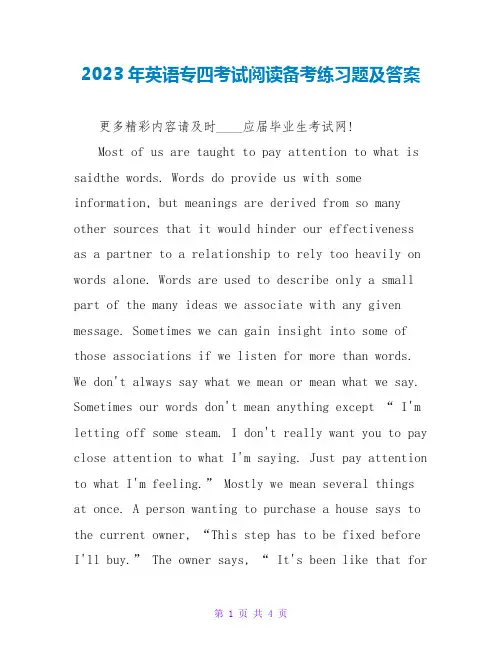
2023年英语专四考试阅读备考练习题及答案更多精彩内容请及时____应届毕业生考试网!Most of us are taught to pay attention to what is saidthe words. Words do provide us with some information, but meanings are derived from so many other sources that it would hinder our effectiveness as a partner to a relationship to rely too heavily on words alone. Words are used to describe only a small part of the many ideas we associate with any given message. Sometimes we can gain insight into some of those associations if we listen for more than words. We don't always say what we mean or mean what we say. Sometimes our words don't mean anything except “ I'm letting off some steam. I don't really want you to pay close attention to what I'm saying. Just pay attention to what I'm feeling.” Mostly we mean severa l things at once. A person wanting to purchase a house says to the current owner, “This step has to be fixed before I'll buy.” The owner says, “ It's been like that foryears.” Actually, the step hasn't been like that for years, but the unspoken message is: “ I don't want to fix it. We put up with it. Why can't you?” The search for a more expansive view of meaning can be developed of examining a message in terms of who said it, whenit occurred, the related conditions or situation, and how it was said.We would do well to listen for how messages are presented. The words, “If sure has been nice to have you over,” can be said with emphasis and excitement or ritualistically. The phrase can be said once or repeated several times. And the meanings we associate with the phrase will change accordingly. Sometimes if we say something infrequently it assumes more importance; sometimes the more we say something the less importance it assumes.A.they use proper words to carry their ideas.B.they both speak truly of their own feelings.C.they try to understand each other's ideas beyond words.D.they are capable of associating meaning withtheir words.2. “I'm letting off some steam” in paragraph 1 means___.A.I'm just calling your attention.B.I'm just kidding.C.I'm just saying the opposite.D.I'm just giving off some sound.3. The house-owner's exle shows that he actually means___.A.the step has been like that for years.B.he doesn't think it necessary to fix the step.C.the condition of the step is only a minor fault.D.the cost involved in the fixing should be shared.4. Some responses and behaviors may appear very illogical, but are justifiable if___.A.linked to an abnormal amount of assertiveness.B.seen as one's habitual pattern of behavior.C.taken as part of an ordering sequenceD.expressed to a series of charges.5. The word “ritualistically” in the last paragraph equals something done___.A.without true intention.B.light-heartedly.C.in a way of ceremony.D.with less emphasis.答案:DBABC。

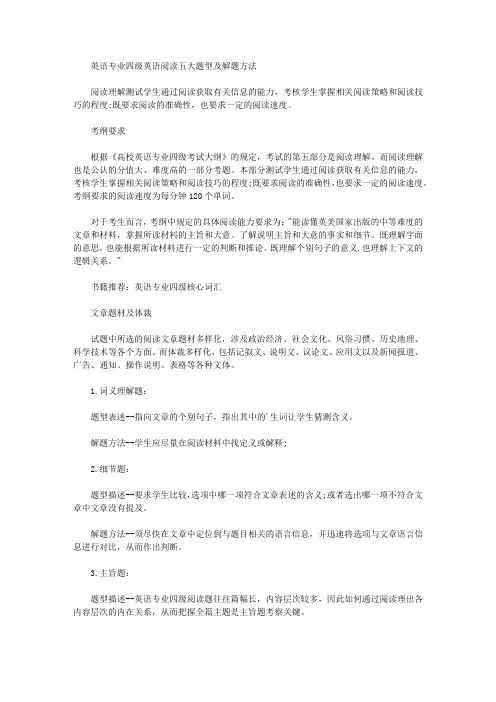
英语专业四级英语阅读五大题型及解题方法阅读理解测试学生通过阅读获取有关信息的能力,考核学生掌握相关阅读策略和阅读技巧的程度;既要求阅读的准确性,也要求一定的阅读速度。
考纲要求根据《高校英语专业四级考试大纲》的规定,考试的第五部分是阅读理解。
而阅读理解也是公认的分值大、难度高的一部分考题。
本部分测试学生通过阅读获取有关信息的能力,考核学生掌握相关阅读策略和阅读技巧的程度;既要求阅读的准确性,也要求一定的阅读速度。
考纲要求的阅读速度为每分钟120个单词。
对于考生而言,考纲中规定的具体阅读能力要求为:"能读懂英美国家出版的中等难度的文章和材料,掌握所读材料的主旨和大意。
了解说明主旨和大意的事实和细节。
既理解字面的意思,也能根据所读材料进行一定的判断和推论。
既理解个别句子的意义,也理解上下文的逻辑关系。
"书籍推荐:英语专业四级核心词汇文章题材及体裁试题中所选的阅读文章题材多样化,涉及政治经济、社会文化、风俗习惯、历史地理、科学技术等各个方面。
而体裁多样化,包括记叙文、说明文、议论文、应用文以及新闻报道、广告、通知、操作说明、表格等各种文体。
1.词义理解题:题型表述--指向文章的个别句子,指出其中的'生词让学生猜测含义。
解题方法--学生应尽量在阅读材料中找定义或解释;2.细节题:题型描述--要求学生比较,选项中哪一项符合文章表述的含义;或者选出哪一项不符合文章中文章没有提及。
解题方法--须尽快在文章中定位到与题目相关的语言信息,并迅速将选项与文章语言信息进行对比,从而作出判断。
3.主旨题:题型描述--英语专业四级阅读题往往篇幅长,内容层次较多,因此如何通过阅读理出各内容层次的内在关系,从而把握全篇主题是主旨题考察关键。
解题方法--不要看细节性内容,而要注意文章中几个容易透露主旨信息的关键位置。
比如:说明文或议论文常开门见山提到以下要展开介绍或论述的信息,因此这类文章的主旨常在文章开头;另外,考题文章往往每一段开头都有一个本段主题句,可浏览每段第一句话后概括出全文主旨;而文章结尾处也经常出现总结性质的语句,同样不容错过。
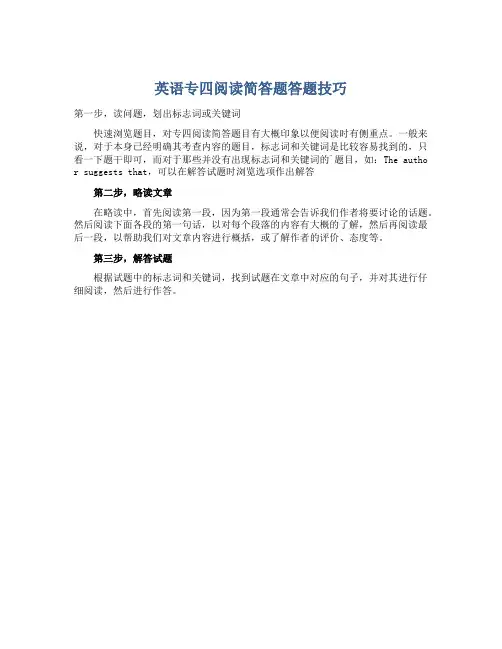
英语专四阅读简答题答题技巧
第一步,读问题,划出标志词或关键词
快速浏览题目,对专四阅读简答题目有大概印象以便阅读时有侧重点。
一般来说,对于本身已经明确其考查内容的题目,标志词和关键词是比较容易找到的,只看一下题干即可,而对于那些并没有出现标志词和关键词的`题目,如:The autho r suggests that,可以在解答试题时浏览选项作出解答
第二步,略读文章
在略读中,首先阅读第一段,因为第一段通常会告诉我们作者将要讨论的话题。
然后阅读下面各段的第一句话,以对每个段落的内容有大概的了解,然后再阅读最后一段,以帮助我们对文章内容进行概括,或了解作者的评价、态度等。
第三步,解答试题
根据试题中的标志词和关键词,找到试题在文章中对应的句子,并对其进行仔细阅读,然后进行作答。
专四阅读真题及答案专四阅读真题及答案在学习和工作的日常里,我们经常跟试题打交道,借助试题可以对一个人进行全方位的考核。
什么样的.试题才是科学规范的试题呢?下面是店铺整理的专四阅读真题及答案,供大家参考借鉴,希望可以帮助到有需要的朋友。
In this section there are three passages followed by ten multiple choice questions. For each multiple choice question, there are four suggested answers marked A, B, C and D. Choose the one that you think is the best answer and mark your answers on ANSWER SHEET TWO. PASSAGE ONE(1)When I was twenty-seven years old, I was a mining-broker's clerk in San Francisco, and an expert in all the details of stock traffic. I was alone in the world, and had nothing to depend upon but my wits and a clean reputation; but these were setting my feet in the road to eventual fortune, and I was content with the prospect. My time was my own after the afternoon board, Saturdays, and I was accustomed to putting it in on a little sail-boat on the bay. One day I ventured too far, and was carried out to sea. Just at nightfall, when hope was about gone, I was picked up by a small ship which was bound for London. It was a long and stormy voyage, and they made me work my passage without pay, as a common sailor. When I stepped ashore in London my clothes were ragged and shabby, and I had only a dollar in my pocket. This money fed and sheltered me twenty-four hours. During the next twenty-four I went without food and shelter.(2)About ten o'clock on the following morning, dirty and hungry, I was dragging myself along Portland Place, when a child that was passing, towed by a nurse-maid, tossed a big pear -minus one bite - into the gutter. I stopped, of course, and fastened my desiring eye on that muddy treasure. My mouth watered for it, my stomach craved it, my whole being, begged for it. But every time I made a move to get it some passing eye detected my purpose, and of course I straightened up then, and looked indifferent and pretended that I hadn't been thinking about the pear at all. This same thing kept happening and happening, and I couldn't get the pear.(3)I was just getting desperate enough to brave all the shame, and to seize it, when a window behind me was raised, and a gentleman spoke out of it, saying: "Step in here, please."(4)I was admitted by a man servant, and shown into a sumptuous room where a couple of elderly gentlemen were sitting. They sent away the servant, and made me sit down. They had just finished their breakfast, and the sight of the remains of it almost overpowered me. I could hardly keep my wits together in the presence of that food, but as I was not asked to sample it,I had to bear my trouble as best as I could.(5)Now, something had been happening there a little before, which I did not know anything about until a good many days afterwards, but I will tell you about it now. Those two old brothers had been having a pretty hot argument a couple of days before, and had ended by agreeing to decide it by a bet, which is the English way of settling everything.(6)You will remember that the Bank of England once issued two notes of a million pounds each, to be used for a special purpose connected with some public transaction with a foreign country. For some reason or other only one of these had been used and canceled; the other still lay in the vaults of the Bank. Well, the brothers, chatting along, happened to get to wonderingwhat might be the fate of a perfectly honest and intelligent stranger who should be turned adrift in London without a friend, and with no money but that million-pound bank-note, and no way to account for his being in possession of it. Brother A said he would starve to death; Brother B said he wouldn't. Brother A said he couldn't offer it at a bank or anywhere else, because he would be arrested on the spot. So they went on disputing till Brother B said he would bet twenty thousand pounds that the man would live thirty days, anyway, on that million, and keep out of jail, too. Brother A took him up. Brother B went down to the Bank and bought that note. Then he dictated a letter, which one of his clerks wrote out in a beautiful round hand, and then the two brothers sat at the window a whole day watching for the right man to give it to. (7)I finally became the pick of them.41. In Para. 1, the phrase "set my feet" probably means___________. A. put me aside B. start my journey C. prepare me D. let me walk42. It can be concluded from Para. 2 that___________.A. the man wanted to maintain dignity though starvedB. the man could not get a proper chance to eat the pearC. the man did not really want the pear since it was dirtyD. it was very difficult for the man to get the pear43. Compared with Brother A, Brother B was more ___________ towards the effect of the one-million-pound bank-note on a total stranger. A. neutral B. negative C. reserved D. positive PASSAGE TWO(1)The concept of peace is a very important one in cultures all over the world. Think about how we greet people. In some languages, the phrases for greetings contain the word for peace. In some cultures we greet people by shaking hands or withanother gesture to show that we are not carrying weapons—that we come in peace. And there are certain symbols which people in very different cultures recognize as representing peace. Let's look at a few of them.The dove(2)The dove has been a symbol of peace and innocence for thousands of years in many different cultures. In ancient Greek mythology it was a symbol of love and the renewal of life. In ancient Japan a dove carrying a sword symbolized the end of war.(3)There was a tradition in Europe that if a dove flew arounda house where someone was dying then their soul would be at peace. And there are legends which say that the devil can turn himself into any bird except for a dove. In Christian art, the dove was used to symbolize the Holy Ghost and was often painted above Christ's head.(4)But it was Pablo Picasso who made the dove a modern symbol of peace when he used it on a poster for the World Peace Congress in 1949.The rainbow(5)The rainbow is another ancient and universal symbol, often representing the connection between human beings and their gods. In Greek mythology it was associated with Iris, the goddess who brought messages from the gods on Mount Olympus. In Scandinavian mythology the rainbow was a bridge between the gods and the earth. In the Bible a rainbow showed Noah that the Biblical flood was finally over, and that God had forgiven his people. In the Chinese tradition, the rainbow is a common symbol for marriage because the colours represent the union of yin and yang. Nowadays the rainbow is used by many popular movements for peace and the environment,representing the possibility of a better world in the future and promising sunshine after the rain.Mistletoe(6)This plant was sacred in many cultures, generally representing peace and love. Most people know of the tradition of kissing under the mistletoe at Christmas time, which probably comes from Scandinavian mythology. The goddess Freya's son was killed by an arrow made of mistletoe, so, in honour of him, she declared that it would always be a symbol of peace. It was often hung in doorways as a sign of friendship.(7)The ancient Druids believed that hanging mistletoe in your doorway protected you from evil spirits. Tribes would stop fighting for a period of time if they found a tree with mistletoe. But you will never see mistletoe in a Christian church - it is banned because of its associations with pagan religion and superstition.The olive branch(8)The olive tree has always been a valuable source of food and oil. In Greek mythology, the goddess Athena gave the olive tree to the people of Athens, who showed their gratitude by naming the city after her. But no one knows for sure when or why it began to symbolize peace. There is probably a connection with ancient Greece. Wars between states were suspended during the Olympic Games, and the winners were given crowns of olive branches. The symbolism may come from the fact that the olive tree takes a long time to produce fruit, so olives could only be cultivated successfully in long periods of peace. Whatever the history, the olive branch is a part of many modern flags symbolizing peace and unity. One well-known example is the United Nations symbol.The ankh(9)The ankh is an ancient symbol which was adopted by the hippie movement in the 1960s to represent peace and love. It was found in many Asian cultures, but is generally associated with ancient Egypt. It represented life and immortality. Egyptians were buried with an ankh, so that they could continue to live in the "afterworld". The symbol was also found along the sides of the Nile, which gave life to the people. They believed that the ankh could control the flow of the river and make sure that there was always enough water.44. Which of the following is the best title for the passage?A. Concept of Peace.B. Origin of Peace Symbols.C. Popular Peace Symbols.D. Cultural Difference of Peace.45. The rainbow represents the connection between human beings and their gods in all the following countriesEXCEPT___________. A. Sweden B. Greece C. Finland D. China46. In North Europe mistletoe was often hung in doorways to indicate___________. A. friendship B. love C. kinship D. honour47. The origin of the ankh can date back to___________. A. the Nile B. the "afterworld" C. the hippie movement D. ancient Egypt PASSAGE THREE(1)Two sides almost never change: That you can manipulate people into self-sufficiency and that you can punish them into good citizenship.(2)The first manifests itself in our tireless search for the magical level at which welfare grants are big enough to meet basic needs but small enough to make low-paid work attractive. The second has us looking to the criminal justice system to cure behavior that is as much as anything the result of despair.(7)Not only can we never find the "perfect" punishment, oursearch for optimum penalties is complicated by our desire for fairness: to let the punishment fit the crime. The problem is that almost any punishment - even the disgrace of being charged with a crime - is sufficient to deter the middle class, while for members of the underclass, probation may be translated as "I beat it."(8)So how can you use the system - welfare or criminal justice - to produce the behavior we want? The answer, I suspect is: You can't.(9)We keep trying to use welfare and prison to change people - to make them think and behave the way we do - when the truth is the incentives work only for those who already think the way we do: who view today's action with an eye on the future.(10)We will take lowly work (if that is all that's available) because we believe we can make bad jobs work for us. We avoid crime not because we are better people but because we see getting caught as a future-wrecking disaster. We are guided by a belief that good things will happen for us in the future if we take proper care of the present. Even under the worst of circumstances, we believe we are in control of our lives.(11)And we have trouble understanding that not everybody believes as we believe. The welfare rolls, the prisons and the mean streets of our cities are full of people who have given up on their(3)The welfare example is well known. We don't want poor people to live in squalor or their children to be malnourished. But we also don't want to subsidize the indolence of people who are too lazy to work. The first impulse leads us to provide housing, food stamps, medical care and a cash stipend for families in need. The second gets us to think about "workforce".(4)We've been thinking about it for two reasons: the "nanny"problems of two high-ranking government officials (who hired undocumented foreigners as household helpers, presumably because they couldn't find Americans to do the work) and President Clinton's proposal to put a two-year limit on welfare.(5)Maybe something useful will come of Clinton's idea, but I'm not all that hopeful. It looks to me like one more example of trying to manipulate people into taking care of themselves.(6)On the criminal justice side, we hope to make punishment tough enough to discourage crime but not so tough as to clog our prisons with relatively minor offenders. Too short a sentence, we fear, will create contempt for the law. Too long a sentence will take up costly space better used for the violent and unremorseful.(7)Not only can we never find the "perfect" punishment, our search for optimum penalties is complicated by our desire for fairness: to let the punishment fit the crime. The problem is that almost any punishment - even the disgrace of being charged with a crime - is sufficient to deter the middle class, while for members of the underclass, probation may be translated as "I beat it."(8)So how can you use the system - welfare or criminal justice - to produce the behavior we want? The answer, I suspect is: You can't.(9)We keep trying to use welfare and prison to change people - to make them think and behave the way we do - when the truth is the incentives work only for those who already think the way we do: who view today's action with an eye on the future.(10)We will take lowly work (if that is all that's available) because we believe we can make bad jobs work for us. We avoid crime not because we are better people but because we see getting caught as a future-wrecking disaster. We are guided by a belief that good things will happen for us in the future if we takeproper care of the present. Even under the worst of circumstances, we believe we are in control of our lives.(11)And we have trouble understanding that not everybody believes as we believe. The welfare rolls, the prisons and the mean streets of our cities are full of people who have given up on their future. Without hope for the future, hard work at a low-paid job makes no sense. Working hard in school, or pleasing a boss, or avoiding pregnancy makes no sense. The deadly disease is hopelessness. The lawlessness and poverty are only the obvious symptoms.(12)I'm not advocating that we stop looking for incentives to move poor people toward self-sufficiency or that we stop punishing people for criminal behavior. There will always be some people who need help and some who deserve to be in jail.(13)All I'm saying is that the long-term answer both to welfare and the crime that plagues our communities is not to fine tune the welfare and criminal justice systems but to prevent our children from getting the disease of despair.(14)If we encourage our young people to believe in the future, and give them solid evidence for believing, we'll find both crime and poverty shrinking to manageable proportions.48. What is the author's attitude towards Clinton's proposal to welfare? A. Pessimistic. B. Optimistic. C. Suspicious. D. Sarcastic.49. It can be inferred from Para. 7 that optimum penalties are___________to the underclass. A. useless B. hopeless C. frightening D. humiliating50. Which of the following is the most appropriate title for the passage?A. Lawlessness and Poverty.B. Criminal Justice System.C. Welfare Grants.D. Disease of Despair.SECTION B SHORT ANSWER QUESTIONSIn this section there are five short answer questions based on the passages in Section A. Answer the questions with NO more than TEN words in the space provided on ANSWER SHEET TWO. PASSAGE ONE51. In Para. 4, what does the man mean by saying "I had to bear my trouble"?52. What can be inferred from the last sentence of the passage?PASSAGE TWO53. Why does the UN use the olive branch in its symbol?PASSAGE THREE54. According to the author, what balance should we keep in welfare?55. What does the author mean by saying "Even under the worst of circumstances, we believe we are in control of our lives" (Para. 10)?参考答案PART V READING COMPREHENSION41-50: BADBD ADCBD51.Keep wits together in the presence of that food.52.The author was given the million-pound bank-note.53.It symbolizes peace and unity.54.Meeting basic needs and making low-paid work.55.Good things will happen by taking care of the present.。
专四英语阅读题专四英语阅读题下面是店铺给大家提供的.专业四级的英语阅读题及答案,欢迎大家参考练习!第一篇:What we know of prenatal development makes all this attempt made by a mother to mold the character of her unborn child by studying poetry, art, or mathematics during pregnancy seem utterly impossible. How could such extremely complex influences pass from the mother to the child? There is no connection between their nervous systems. Even the blood vessels of mother and child do not join directly. An emotional shock to the mother will affect her child, because it changes the activity of her glands and so the chemistry her blood. Any chemical change in the mother's blood will affect the child for better or worse. But we can not see how a looking for mathematics or poetic genius can be dissolved in blood and produce a similar liking or genius in the child.In our discussion of instincts we saw that there was reason to believe that whatever we inherit must be of some very simple sort rather than any complicated or very definite kind of behavior. It is certain that no one inherits a knowledge of mathematics. It may be, however, that children inherit more or less of a rather general ability that we may call intelligence. If very intelligent children become deeply interested in mathematics, they will probably make a success of that study.As for musical ability, it may be that what is inherited is an especially sensitive ear, a peculiar structure of the hands or the vocal organs connections between nerves and muscles that makeit comparatively easy to learn the movements a musician must execute, and particularly vigorous emotions. If these factors are all organized around music, the child may become a musician. The same factors, in other circumstance might be organized about some other center of interest. The rich emotional equipment might find expression in poetry. The capable fingers might develop skill in surgery. It is not the knowledge of music that is inherited, then nor even the love of it, but a certain bodily structure that makes it comparatively easy to acquire musical knowledge and skill. Whether that ability shall be directed toward music or some other undertaking may be decided entirely by forces in the environment in which a child grows up.1. Which of the following statements is not true?A. Some mothers try to influence their unborn children by studying art and other subjects during their pregnancy.B. It is utterly impossible for us to learn anything about prenatal development.C. The blood vessels of mother and child do not join directly.D. There are no connection between mother's nervous systems and her unborn child's.2. A mother will affect her unborn baby on the condition that ____.A. she is emotionally shockedB. she has a good knowledge of inheritanceC. she takes part in all kind of activitiesD. she sticks to studying3. According to the passage, a child may inherit____.A. everything from his motherB. a knowledge of mathematicsC. a rather general ability that we call intelligenceD. her mother's musical ability4. If a child inherits something from his mother, such as an especially sensitive ear, a peculiar structure of the hands or of the vocal organs, he will ____.A. surely become musicianB. mostly become a poetC. possibly become a teacherD. become a musician on the condition that all these factors are organized around music5. Which of the following is the best title for the passage?A. Role of Inheritance.B. An Unborn Child.C. Function of instincts.D. Inherited T alents第二篇:The case for college has been accepted without question for more than a generation. All high school graduates ought to go, says conventional wisdom and statistical evidence, because college will help them earn more money, become "better" people, and learn to be more responsible citizens than those who don't go.But college has never been able to work its magic for everyone. And now that close to half our high school graduates are attending, those who don't fit the pattern are becoming more numerous, and more obvious. College graduates are selling shoes and driving taxis; college students interfere with each other's experiments and write false letters of recommendation in the intense competition for admission to graduate school. Other find no stimulation in their studies, and drop out—often encouraged by college administrators.Some observers say the fault is with the young people themselves—they are spoiled and they are expecting too much.But that is a condemnation of the students as a whole, and doesn't explain all campus unhappiness. Others blame the state of the world, and they are partly right. We have been told that young people have to go to college because our economy can't absorb an army of untrained eighteen-year-olds. But disappointed graduates are learning that it can no longer absorb an army of trained twenty-two-year-olds, either.Some adventuresome educators and watchers have openly begun to suggest that college may not be the best, the proper, the only place for every young person after the completion of high school. We may have been looking at all those surveys and statistics upside down, it seems, and through the rosy glow of our own remembered college experiences. Perhaps college doesn't make people intelligent, ambitious, happy, liberal, or quick to learn things—may it is just the other way around, and intelligent, ambitious, happy, liberal, quick-learning people are merely the ones who have been attracted to college in the first place. And perhaps all those successful college graduates would have been successful whether they had gone to college or not. This is heresy to those of us who have been brought up to believe that if a little schooling is good, more has to be much better. But contrary evidence is beginning to mount up.1.According to the author, ___.A.people used to question the value of college education.B.people used to have full confidence in higher education.C.all high school graduates went to college.D.very few high school graduates chose to go to college.2.In the 2nd paragraph, "those who don't fit the pattern" refer to___.A.high school graduates who aren't suitable for collegeeducation.B.college graduates who are selling shoes and driving taxis.C.college students who aren't any better for their higher education.D.high school graduates who failed to be admitted to college.3.The dropout rate of college students seems to go up because___.A.young people are disappointed with the conventional way of teaching at college.B.many people are required to join the army.C.young people have little motivation in pursuing a higher education.D.young people don't like the intense competition for admission to graduate school.4.According to the passage, the problems of college education partly originate in the fact that___.A.society cannot provide enough jobs for properly trained graduates.B.High school graduates do not fit the pattern of college education.C.Too many students have to earn their own living.D.College administrators encourage students to drop out.5.In this passage the author argues that___.A.more and more evidence shows college education may not be the best thing for high school graduates.B.College education is not enough if one wants to be successful.C.College education benefits only the intelligent, ambitious, and quick-learning people.D.Intelligent people may learn quicker if they don't go tocollege.>>>>>>参考答案<<<<<<第一篇:BACDA第二篇:BCCAA。
专四试题及答案2024一、听力理解(共20分)1. 短对话理解(共5分)- 根据所听对话,选择正确答案。
- 例:What is the man going to do?- A. Go to the library.- B. Go to the cinema.- C. Go to the concert.- 答案:A2. 长对话理解(共5分)- 根据所听对话,回答以下问题。
- 例:What is the main topic of the conversation?- 答案:The main topic is the upcoming holiday plans.3. 新闻听力(共5分)- 根据所听新闻,选择正确答案。
- 例:What is the news report mainly about?- A. A new policy.- B. A natural disaster.- C. A sports event.- 答案:B4. 听力填空(共5分)- 根据所听短文,填写空缺的单词或短语。
- 例:The project was completed on _______.- 答案:schedule二、阅读理解(共30分)1. 快速阅读(共10分)- 阅读文章,判断下列句子是否正确。
- 例:The article mainly discusses the benefits of exercise.- 答案:True2. 深度阅读(共20分)- 阅读文章,回答以下问题。
- 例:What is the author's opinion on the issue?- 答案:The author believes that the issue requires a balanced approach.三、词汇与语法(共20分)1. 词汇选择题(共10分)- 选择最合适的词填空。
- 例:The _______ of the new policy was met with mixed reactions.- A. introduction- B. conclusion- C. exclusion- 答案:A2. 语法填空(共10分)- 根据句子结构,填写正确的语法形式。
浅谈英语专业四级阅读理解简答题解题技巧作者:代梦来源:《考试与评价》2021年第08期【摘要】阅读理解是英语专业四级考试的重要组成部分,其目的在于检测考生综合运用阅读技能从阅读语境中准确获取和推导语篇言语意义的能力。
改革之后增加的阅读理解简答题一直是考生比较头疼的部分。
本文通过分析,根据专业四级考试阅读理解的简答题型提出相应的解题技巧,帮助考生更准确巧妙地解题,在提高基本能力的基础上有效提高成绩。
【关键词】英语专业四级考试阅读理解简答题型解题技巧一、概述高校英语专业四级考试(TEM4)是面向全国英语专业本科二年级学生的一项大规模、标准化考试,是评估英语专业本科教学的一项重要指标。
2015年,外语专业教学测试专家委员会经过讨论,决定从2016年起对TEM4考试的试卷结构和测试题型作局部调整。
其中阅读理解部分采用多项选择题和问答题形式结合的方式出题。
每篇文章都有对应的选择题和简答题。
题量由 20 题减少为 15 题,其中10道多项选择题,5道简答题。
学生应根据所读材料内容,从每道题的四个选项中选出一个最佳的答案,或根据问题做简短回答,简短回答要求答案不超过十个单词。
阅读理解部分测试时长由 25 分钟延长至 35 分钟,而总分数与权重均保持不变(见表 1)。
二、简答题形式2016年专四改革之后新增加的简答题每个题目都是一个特殊问句,要求根据原文内容作出回答,答案单词数不超过十个。
具体形式如下:Section B Short Answer QuestionsIn this section there are five short answer questions based on the passages in SECTION A.Answer each question in NO more than 10 words in the space provided on ANSWERSHEET TWO.PASSAGE ONEIn Para. 4,what does the man mean by saying “I had to bear my trouble”?What can be inferred from the last sentence of the passage?PASSAGE TWOWhy does the UN use the olive branch in its symbol?PASSAGE THREEAccording to the author, what balance should we keep in welfare?What does the author me an by saying “Even under the worst of circumstances, we believe we are in control of our lives”(Para. 10)?简答题类型主要分为主旨题、细节题、推导题和态度题。